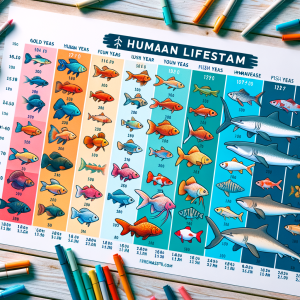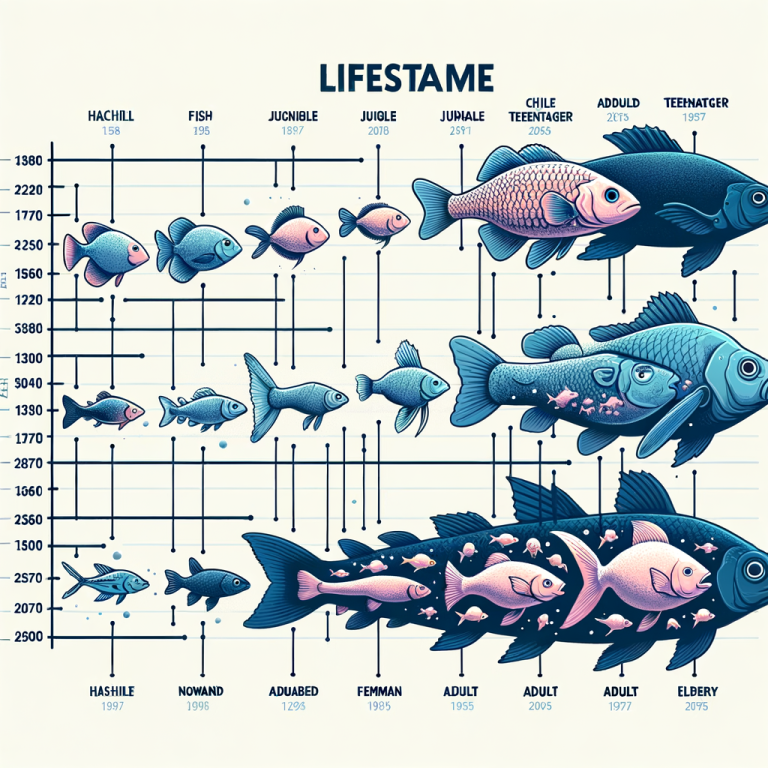Fish Years vs Human Years
Have you ever wondered how old your fish really is in human years? Understanding fish years compared to human years is crucial for proper care and management. Let’s dive into the fascinating world of fish aging and explore the factors that influence their lifespan.
Understanding Fish Years Compared to Human Years
Discover the fascinating comparison between the lifespan of fish and humans, and how it can provide insight into the aging process of different species.
Fish Years vs Human Years
When it comes to understanding the age of fish, it’s important to consider the concept of fish years compared to human years. Let’s delve into how fish age is calculated and compare their lifespan to that of humans. Here are some key points to consider:
Explanation of How Fish Age is Calculated
Fish age is typically calculated based on the number of growth rings found in their otoliths, scales, or other bony structures. These rings indicate periods of growth and can be used to estimate the age of the fish.
Comparison of Fish Lifespan to Human Lifespan
When we compare the lifespan of fish to that of humans, it’s important to note that different fish species have varying lifespans. For example:
- A goldfish, which can live for about 10-15 years in human years
- A koi fish, which can live for about 25-35 years in human years
- A rockfish, which can live for about 60-100 years in human years
Understanding these comparisons helps us appreciate the longevity of certain fish species and the responsibility that comes with caring for them.
By understanding fish years compared to human years, we gain valuable insights into the aging process of these aquatic creatures. This knowledge allows us to provide better care and management for our fish, ensuring their well-being and longevity.
Factors Affecting Fish Age
Understanding the aging process in fish is crucial for their proper care and management. Several factors can influence the lifespan of fish, including environmental and genetic factors.
Environmental Factors
Environmental conditions play a significant role in determining the age of fish. Factors such as water quality, temperature, and availability of food can impact the lifespan of fish. For example, fish living in polluted waters or extreme temperatures may have a shorter lifespan compared to those in clean, optimal conditions.
Genetic Factors
Genetics also play a crucial role in determining the age of fish. Different fish species have varying genetic predispositions to aging. Some species may have a longer lifespan due to their genetic makeup, while others may have a shorter lifespan. Additionally, selective breeding and genetic manipulation can also influence the aging process in fish.
By understanding these factors, fish owners and aquaculturists can provide the best possible environment for their fish, ultimately contributing to their longevity and well-being. It is essential to consider fish years compared to human years when assessing the impact of these factors on the aging process.
 Fish Age and Size
Fish Age and Size
Understanding the relationship between the age and size of a fish is crucial in managing and caring for them. Here, we will explore how the size of a fish can be used to estimate its age and provide examples of different fish species and their average size at different ages.
Relationship between Fish Size and Age
– The size of a fish can provide valuable insights into its age, as fish tend to grow at predictable rates over time.
– By examining the size of a fish, it is possible to estimate its age and gain a better understanding of its life stage and potential health.
Estimating Fish Age Based on Size
– Fish age can be estimated by measuring their length and comparing it to growth charts specific to their species.
– This method allows fish owners and researchers to determine the age of a fish without having to rely solely on traditional aging techniques.
Examples of Fish Species and Their Average Size at Different Ages
– The Atlantic salmon, for example, can reach an average size of 28 inches (71 cm) at 4 years old (3 years old).
– The common goldfish typically grows to an average size of 6 inches (15 cm) at 10 years old (8 years old).
– The bluefin tuna can reach an average size of 6.5 feet (2 meters) at 10 years old (8 years old).
By understanding the relationship between fish age and size, fish owners and researchers can better assess the health and well-being of their fish. This knowledge also contributes to the overall care and management of fish populations in various environments.
Fish Age and Development
Understanding the age of a fish is crucial for proper care and management. Just like humans, fish age impacts their development and overall well-being. Here’s a comparison of developmental milestones in fish and humans:
Impact of Fish Age on Development
Just as human age affects our physical and mental development, fish age plays a significant role in their growth and behavior. It’s important to consider the age of a fish when caring for them, as it directly impacts their needs and requirements.
Comparison of Developmental Milestones
While humans reach certain milestones at specific ages, such as walking and talking, fish also have their own developmental milestones. Understanding these milestones can help fish owners provide appropriate care and support for their pets.
For example, a one-year-old goldfish is equivalent to a 15-year-old human, and at this age, they are still considered juveniles. It’s important to provide them with a suitable environment and diet to support their continued growth and development.
By understanding the concept of fish years compared to human years, fish owners can ensure that they are meeting the needs of their pets at every stage of their lives.
Conclusion
Understanding fish years compared to human years is crucial for proper care and management of fish. By considering the age of their fish, owners can ensure they provide the appropriate environment and support for their pets. It is important to remember that fish age differently than humans, and this understanding can lead to better care and a deeper appreciation for these fascinating creatures.


Comments are closed.